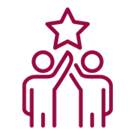Polar Puffs & Cakes
Improving the workforce one step at a time through Workplace Learning
Background
Today, business leaders realised the immense difficulties in hiring for their businesses. Reality is, there just aren’t enough talents available, not to mention the rising costs in the aspect of human resource and recruitment.
The silver lining to this situation? Organisations can look towards upskilling their existing workforce – to expand their capabilities and employability to fulfill the talent needs of a rapidly changing economy.
At a Glance
With a strong heritage branding within the pastry industry in Singapore, Polar Puffs & Cakes (Polar) seeks to continue what they know best – to produce tasty, quality pastries and cakes to customers.
As part of a no retirement and retrenchment policy, Polar is working to upskill its current workforce by paying close attention to the employability of its employees to keep up in a highly digitalised world. The first step was to upskill its workforce, given the manpower crunch across various sectors during the pandemic.
Learn more about their transformation journey below.
What today’s employees are looking for

Support from companies in upgrading their skillsets for continued employability
45% of employees say their organisation provide them with upskilling opportunities.
While it is common for organisations and business leaders to see upskilling as a short-term fix to mending immediate skills gaps, the fact is that continuous upskilling is the way to go in developing a strategically competitive workforce.

Companies that prioritise their well-beingIn today’s context, supporting the well-being of employees has become a priority, and within Asia Pacific, it is the third most popular strategy for addressing skills shortages.
Despite that, when it comes to absolute terms, only
36% of employees felt that their physical and mental well-being are being supported.

Meaningfulness of their work, aside from monetary incentivesWhen asked about job satisfaction, only
57% of employees stated that they are satisfied with their current job.
Though monetary incentives and rewards are motivational factors, your employees also value other aspects of their jobs. Today’s employees want work that provides a sense of fulfilment and meaning.
Source: Report by PWC, titled “Asia Pacific Workforce Hopes and Fears Survey 2022”.
Transforming the workforce through workplace learning
The winds of change are stronger than ever in enterprises today, following the aftermath of the pandemic. It is of no surprise that just about every organisation will have to transform its workforce to remain relevant, and to keep up the pace in the new normal.
However, transformation is never so straightforward, given that it involves change of differing magnitudes. Even so, Polar recognises the essentiality of having a lean workforce, especially in the face of issues such as manpower shortages and difficulties in recruiting and retaining staff. Hence, the organisation collaborated with NACE@IAL and embarked on a workplace learning journey with the aim of transforming its workforce to be future-ready.
Looking to embark on a workplace transformation project with us, but not sure which of our initiatives would fit your needs?
Click here to find out what we offer.
Alternatively, you can
Talk To Us
We joined the Learning Enterprise Alliance (LEA) initiative to revise our existing OJT Blueprint mapped to Skills Framework (SFw) for SkillsFuture’s course accreditation. This goes in line with our endeavour of developing the competencies of our staffs.
We are certain that the initiative will help improve the training process and the skills of our operations team to consistently provide excellent service.
Mr. Francis LooiChief Executive Officer
It was a meaningful learning journey. Though it wasn’t an easy process, we believed that this is the way forward to strengthening our competencies and skillsets in meeting the ever-changing demands within the Food Service Sector.
As the company emphasizes strongly on the continuous development of our people, we will continue to explore different partnerships, such as the LEA initiative, to help us in our vision of building a competent workforce.
Ms. Cherry BajaroAssistant Learning & Development Manager
I have benefitted greatly from this initiative, especially in the aspect of training and developing the skillsets of our team.
The results were great, as the revised OJT blueprint is now mapped in accordance to Skills Framework (SFw) standards. This will help our operations team greatly in acquiring the relevant technical skills and competencies (TSCs) accredited by SkillsFuture. Ms. Valerie ChuangSenior Learning & Development Executive
Identifying existing performance gaps
Given the shift in demands of today’s customers, driving higher customer satisfaction rates and ensuring that all employees are better equipped with the skills to provide quality service standards consistently was paramount to Polar.
To achieve the above, it was essential for the project team to first identify lapses in the service provided by its employees through an in-depth interview. This was to sift out issues arising from the current OJT programme in alignment to current trends, industry requirements, and the Food Services and Retail Skills Framework (SFw). In addition, the information obtained would better allow the team to look into incorporating changes to the job tasks of employees, as well as determining aspects of its operations that could be digitalised.
Facilitating workplace learning practices among employees
In its endeavour to further hone the skills, and facilitate a learning mindset across employees at the workplace, the following interventions were put in place after the identification of existing performance gaps:
- Implementation of a Skills Development plan for its Operations team.
- Development of a training roadmap by adapting and mapping it to relevant competencies in the Skills Framework.
- Refinement of the current on-the-job training (OJT) programme, and aligning it to relevant technical skills and competencies (TSCs).
Scaling up on the workplace learning imperative
At the end of the workplace transformation project with NACE@IAL, Polar was able to achieve the following:

Upskilled 12 employees who completed the WSQ Workplace
Learning Facilitator (WLF) programme by IAL.

Refined and developed an OJT programme that has received WSQ accreditation.

Piloted a module from the OJT programme with a small group of managers and achieved higher course satisfaction rates in comparison to the original programme.
As part of its efforts toward the effective development of skillsets, Polar sought to validate its newly revised OJT programme by attaining Workforce Skills Qualifications (WSQ) accreditation prior to implementing it across the entirety of its workforce.
Given that the accreditation required a significant amount of time to be approved, Polar rolled out a pilot programme within a small group of area managers, which was well-received by those who participated.
Sustenance of workplace learning within the organisation
This journey certainly hasn’t been easy for the project team. Given that its Operations team was involved in the restructuring of the OJT programme, it was essential for them to undergo the WSQ Workplace Learning Facilitator (WLF) programme to better prepare and allow them in overseeing the revised OJT programme coming to fruition. At the same time, this arrangement also meant a longer timeframe in obtaining the WSQ accreditation as the team members had to complete the WLF programme spanning 3 months before they could begin refinement and development work on the OJT programme.
Putting aside the challenges faced, the support of the management, and the participation from the project team members (i.e., members of the Operations team and supervisors) who set aside their time and gave their utmost effort in undertaking the WLF programme were of utmost importance during this journey. Without their commitment and support, it would have been difficult to refine on the OJT programme in alignment with the relevant Skills Framework and technical skills and competencies (TSCs).
The support from their Workplace Learning consultant was equally vital, given that she was not only involved in the WLF programme, but in the development of the OJT programme as well. In addition, she provided timely support to the training team in helping them apply the skills learnt.
Following the completion of the project, the team at Polar is looking towards developing competencies in the aspect of course development and intends to attend the Diploma in Design and Development of Learning for Performance programme. In addition, the organisation also looks forward to developing training roadmaps for other departments (i.e., Factory and Production department).
Ready to embark on a workplace transformation project with us?
Talk To Us